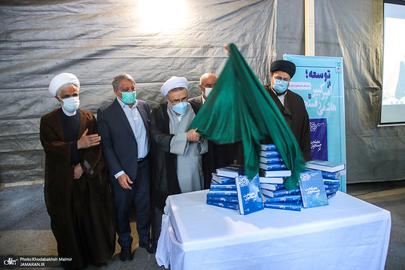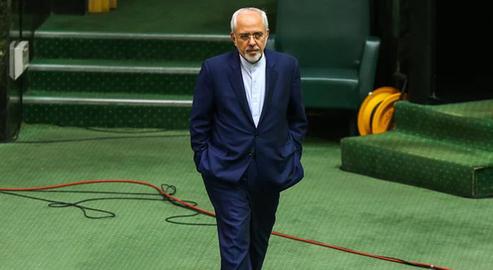In Search of Expediency, Akbar Hashemi Rafsanjani’s recently-published diaries covering the events of 1998, examines one of Iran’s most volatile periods of political crisis.
Rafsanjani's son and the grandson of Ayatollah Khomeini both attended the launch of the 840-page publication, the 18th volume of the former president’s memoirs. As with previous editions, it has sparked debate and speculation, as well as confirmed details of some key events in Iranian modern history.
In 1998, the Islamic Republic was entering a new phase, the first months after Rafsanjani’s eight-year presidency, which had seen one of the chief architects of the Islamic Republic in the highest executive office in the country. At the end of his term he was still one of Ayatollah Ali Khamenei’s confidantes, but he also had a sympathetic ear for the new president, reformist Mohammad Khatami, who took office in August 1997. His tenure was marred by political unrest, turmoil and infighting within the upper ranks of the regime, as well as a long list of human rights violations, including what became known as the Chain Murders, a campaign against some of Iran’s most prominent intellectuals and respected journalists.
In Search of Expediency narrates some of the key moments from the period, from the arrest of Tehran mayor Gholamhossein Karbaschi and the serial killings to the rift between Supreme Leader Ali Khamenei and President Mohammad Khatami.
***
Hashemi Rafsanjani’s view of the changing Iranian political climate in those years is unique, and has huge relevance in today’s environment, particularly regarding what he observed about the Supreme Leader. In one entry, marked “March 22, 1998, Kish”, he wrote: ”In yesterday's speeches in Mashhad, the leader again addressed and attacked supporters of negotiations and communications with the United States, which has been interpreted as his opposition to the government.
Rafsanjani repeatedly expresses his frustration and disappointment, saying he regretted that Khatami had even run for president. He recalls the arrest of Gholamhossein Karbaschi, then mayor of Tehran, and the impeachment of interior minister Abdollah Nouri, as well as Khamenei's support for the hardline parliamentarians who facilitated Nouri's removal. As Rafsanjani wrote. Khamenei also supported the suppression of the administration’s cultural policies and the targeting of the Minister of Culture Islamic Guidance, Ataollah Mohajerani, who was forced to resign in 2000.
One of Ayatollah Khamenei's criticisms of Mohajerani focused on the Writers' Association of Iran and its public celebration of novelist Ahmad Mahmoud, who it awarded a prize.
But overall, 1998 was dominated by two events.
Arrest of Mayor Karbaschi
His entry for Wednesday, April 15, 1998 reads:
"Brother Mohammad [Reza Aref, Khatami’s First Vice President) arrived. He was critical of Mr. Karbaschi's fate ... He said the government's problems had upset Mr. Khatami so much so that on Sunday, after meeting with the Leader and after failing to achieve results, he cried for a while and also lost control during an economic council meeting, and shouted at cabinet ministers. I heard the same from Mr. [Eshagh] Jahangiri [industry minister at the time].”
Rafsanjani writes that as the prosecution of Karbaschi got underway, Ayatollah Khamenei said during a meeting that he had not yet allowed the judiciary to detain the mayor. The former president also quoted Khatami in his memoirs as saying that Khamenei did not agree with the decision to arrest Karbaschi, but after Karbaschi was detained in April 1998, he discussed the matter with Ali Razini, the then Chief Justice of Tehran. Razini had said that Ayatollah Khamenei has agreed to the arrest.
Rafsanjani writes that Karbaschi's arrest prompted Khatami's supporters to distance themselves from Khamenei, discouraged the regime's agents, diminished the trust in the judiciary, and further fueled the rift between Khatami and Khamenei.
"Mr. Khatami talked with the Leader about negotiations and asked for consultation. I went to his office for lunch. He said he had prepared a letter [about Karbaschi’s case], and that he waited for the leader to raise the issue of the mayor's release, but he did not. Eventually, he raised it himself and finally the leader set out the boundaries for the content of the letter, which was different from what he had written. Khatami sent a letter this morning but the Leader returned it ... I prepared new text. I thought theymay not accept this either, because it called for Ali Razini [the Chief Justice of Tehran Province] and Mohammad Reza Naghadi [Chief of Intelligence for the police force, who interrogated the mayor] to be tried.” This entry was dated April 14.
On April 22, Rafsanjani wrote that Khatami’s First Vice President was "angry with the behavior of the judiciary regarding the mayor;” he too felt it had led to criticism of Iran’s leadership and doubts over its political system, he wrote.
Challenges to the System
This touched on another crucial issue: the question of Velayat-e Faqih, the Islamic ideology that guides the Islamic Republic and its system of power. Rafsanjani describes how some political figures were concerned that belief in Velayat-e Faqih and the position of Ayatollah Khamenei were on the decline, partially a result of the clash between the Supreme Leader and Mohammad Khatami. "Hasan [Khomeini, Ayatollah Khomeini's grandson] came in the evening. He described the situation in the Qom constituency,” Rafsanjani wrote, adding that the holy city was one of the places where a decline in support for the Supreme Leader was being felt.
Karbaschi was temporarily released from prison, but the row took the disagreements between Khatami and Khamenei to a new level. As part of an address to an audience at Sharif University of Technology on December 7, 1998, Mohammad Khatami responded to Ayatollah Khamenei’s criticisms about his government, including his perceived fondness for allowing interference from Western governments. "Just as Westernization is bad, opposition to liberalism is a form of fascism," Khatami said. There were opportunities for questions following the speech, which were presented anonymously. These reflected the student population’s concerns about recent prosecutions and suppression of activism.
Rafanjani wrote in his memoir of the events of December 20: "I was a guest of the Supreme Leader ... There was talk about Mr. Khatami's meeting at Sharif University. Ayatollah Khamenei considered it harmful and said that Mr. Khatami was not expected to deal with students. I said that the protests were insulting and are still going on."
Press Freedom and Serial Murders
The Leader and the president clashed over pressure on the media too, as the climate for press freedom was increasingly stifled. This was accompanied by one of the deadliest periods for Iran’s dissenting writers, journalists, activists and artists: the Chain Murders, a series of events that Iran has never been ever to shake off its human rights record.
Among the murders that made it to the headlines were authors Mohammad Jafar Pouyandeh and Mohammad Mokhtari and the political dissident Parvaneh Eskandari and her husband Dariush Forouhar, who led the People's Party of Iran. But writers and writers groups, along with pro-Khatami newspapers, reported many dozens of assassinations, and that they extended beyond Iran's borders.
Eventually, the Ministry of Intelligence spoke out in a number of unprecedented statements. It described the perpetrators as "rogue agents" in the ministry. However, Rafsanjani’s entries between the time of the assassinations and the Ministry of Intelligence announcements revealed what the Islamic Republic's top officials really thought about the tragic events.
"I went to Mr. Khatami's office for lunch," he wrote about a meeting with the president in his office on December 2. "We talked for an hour about important issues. He was very upset by the recent events and said that if he had known that this would happen, he would not have run for election ... He had appointed a group to investigate the killings and he is pessimistic about the Ministry of Intelligence."
A month later, on January 2, 1999, Rafsanjani spoke about meeting with Hassan Rouhani, who was at the time secretary of the Supreme National Security Council. "Dr. Rouhani came to discuss the recent killings. Mr. Khatami had also consulted with him. He does not agree that the killing by intelligence agents should be announced, although he accepts the punishment."
Ideas for Reform Flatly Rejected
On the night of Tuesday January 5, Ali Larijani, then head of Islamic Republic of Iran Broadcasting (IRIB), paid Rafsanjani a visit at home regarding an "urgent matter."
"He said the Ministry of Intelligence had issued a statement on the recent killings and blamed serial killings on 'rogue elements' in the Ministry of Intelligence. He had a correction proposal ... I convinced Mr. Larijani that this change did not serve his purpose. At the end of the night, President Khatami called and said Ayatollah Khamenei had not accepted the Minister of Intelligence’s offer to resign, or that the president would run the ministry for three months."
A television program called Cheragh [Light] featured Ruhollah Hosseinian, a former director of the Ministry of Intelligence, who accused Khatami's entourage of being involved in serial killings. This angered Khatami to such an extent that he went so far as to criticize Khamenei in the presence of others. Rafsanjani’s January 12 entry reads: "At 3:30, I went to the office of the Supreme Leader. A large number of officials had been invited for iftar. Mr. Khatami spoke ... he bitterly criticized last night's Cheragh program and Mr. Hosseinian's remarks in the presence of the Supreme Leader. Given that IRIB is in the hands of the leader, it must have disappointed him as well. He told the leader that at the very least Mr. Larijani should be fired. This was a strong blow.”
Rafsanjani’s memoirs describe how people arrested in connection with the Chain Murders claimed the killings were carried out with the knowledge of the Minister of Intelligence, Ghorban Ali Dori Najafabadi, and that following these revelations Mohammad Khatami tried to replace him and control Ministry of Intelligence operations for three months. He hoped to instigate changes with a view to ensuring such horrors never reoccured. He failed, blocked by the Supreme Leader.
Ayatollah Khamenei not only opposed the president’s plan to overse the Ministry of Intelligence, he actually attributed the killings to foreign agents. "The Leader told me last night that Mr. Mohammad Niazi, the military prosecutor of Tehran and the judge in the case, was gradually coming to the conclusion that there were foreign provocations,” Rafsanjani wrote on February 15.
As with the 17 previous volumes of his memoirs — and there are 18 more to come — Hashemi Rafsanjani’s notes from 1998 provide invaluable insight into the Islamic Republic as it moved into it its third decade. It gives a useful account on the inner machinations of Iranian politics and a good overview of how the country is run (and why). It tracks the early rumblings of rifts between the powerful that continue to grow to this day.
According to a tradition set out by the author himself, the Hashemi Rafsanjani family normally submits a copy of the book to Ayatollah Khamenei prior to publication. But this time, according to Rafsanjani’s oldest son Mohsen Hashemi, who penned the foreword to the book, the manuscript for the 1998 memoirs was presented to Ayatollah Khamenei's office and not to him personally due to the coronavirus pandemic.
This suggests debate and discussion around the new book could continue, and that some of the commentary could come from Ayatollah Khamenei himself.
Related Coverage:
Khamenei and Rafsanjani: A Friendship That Turned Sour
Khamenei Begrudges His Critics Even After Their Death
Decoding Iran's Politics: The Chain Murders of Dissidents
visit the accountability section
In this section of Iran Wire, you can contact the officials and launch your campaign for various problems


























comments